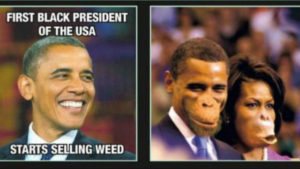
The publication failed miserably in trying to claim it was satire. The joke was supposed to involve Russian President Vladimir Putin sending a message that included a photo of Obama saying he was selling marijuana and the accompanying insulting photoshopped image of America’s first Black president and his wife.
Of course, right-thinking people were outraged and flooded the newspaper with complaints, forcing it to issue this half-hearted contrition: “When you consider the fragment apart from its context, which is a properly worked out satirical section, then you don’t see the joke but just a picture evoking sheer racism. We wrongly assumed that racism is no longer accepted, and that in this way it could be the subject of a joke.
“In this case, we plead guilty of bad taste. We continue to be on the side of those that are battling any form of racism.”
A burning question: Why do racists associate apes with Black people? Rodner Figueroa was fired from Univision last month for suggesting Mrs. Obama could have been cast in the Planet of the Apes franchise.
This idiocy goes back to the mid-19th century, when scientific racism in the United States was graphically promoted in a book called Types of Mankind by Josiah C. Nott and George Robins Gliddon. It used misleading illustrations to suggest that “Negroes” ranked between “Greeks” and chimpanzees.
Jennifer Eberhardt, a Stanford associate professor of psychology who is Black, said in a 2008 study on the subject entitled “Not Yet Human: Implicit Knowledge, Historical Dehumanization and Contemporary Consequences” by psychologists at Stanford, Pennsylvania State University and the University of California-Berkeley that many subconsciously associate Black people with apes.
“When we have a history like that in this country, I don’t know how much of that goes away completely, especially to the extent that we are still dealing with severe racial inequality, which fuels and maintains those associations in ways that people are unaware,” she said.
Eberhardt added that science education could be partly responsible for reinforcing the warped view that Black people are less evolved than whites. An iconic 1970 illustration, “March of Progress,” published in the Time-Life book Early Man, depicts evolution beginning with a chimpanzee and ending with a white man.
“It’s a legacy of our past that the endpoint of evolution is a white man,” Eberhardt said. “I don’t think it’s intentional, but when people learn about human evolution, they walk away with a notion that people of African descent are closer to apes than people of European descent. When people think of a civilized person, a white man comes to mind.”
Discovering these perceptions startled her, Eberhardt said. “This was actually some of the most depressing work I have done. This shook me up. You have suspicions when you do the work—intuitions—you have a hunch. But it was hard to prepare for how strong [the black-ape association] was—how we were able to pick it up every time.”
The research took place over six years at Stanford and Penn State under Eberhardt’s supervision. It involved mostly white male undergraduates. In a series of studies that subliminally flashed Black or white male faces on a screen for a fraction of a second to “prime” the students, researchers found subjects could identify blurry ape drawings much faster after they were primed with black faces than with white faces. The researchers consistently discovered a black-ape association even if the young adults said they knew nothing about its historical connotations.
The connection was made only with African-American faces; the paper’s third study failed to find an ape association with other non-white groups, such as Asians. Despite such race-specific findings, the researchers stressed that dehumanization and animal imagery have been used for centuries to justify violence against many oppressed groups.
“Despite widespread opposition to racism, bias remains with us,” Eberhardt said. “African Americans are still dehumanized; we’re still associated with apes in this country. That association can lead people to endorse the beating of Black suspects by police officers, and I think it has lots of other consequences that we have yet to uncover.”



